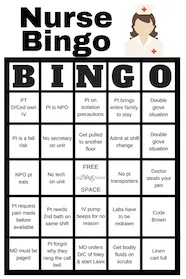How can hospitals create an appealing work environment for nurses? This question is of importance in the healthcare industry. It’s crucial for hospitals to seriously consider the question: what do nurses want? And thereby put in the effort to offer an attractive atmosphere that allows the organization to recruit and retain top nursing professionals.
By focusing on factors such as competitive compensation, work-life balance, professional growth opportunities, and fostering a positive work culture, hospitals can become the preferred choice for nursing staff.
Table of Contents
Challenges Faced by Nurses
Nursing, although a fulfilling career, comes with its share of challenges. Challenges that have likely contributed to the current nursing shortage.
This shortage further intensifies the workload burden on existing nursing staff. According to the American Nurses Association (ANA), 70% of nurses report experiencing burnout due to increased workloads and longer working hours.
Moreover, the Bureau of Labor Statistics highlights that nurses encounter higher rates of workplace-related injuries and illnesses compared to other professions. This is primarily due to the demands associated with patient care.
In a study published before the pandemic, we learned that approximately 33% of nursing staff experience symptoms of depression – a rate nearly twice as high as that found in the general U.S. Population.
These challenges often arise due to the pressures of caring for patients, combined with lengthy and unpredictable shifts. As vital members of the healthcare team, nurses often have to fill the gaps and work odd hours.
Furthermore, in the midst of global health crises like the COVID-19 pandemic, registered nurses frequently find themselves on the front lines. The Centers for Disease Control and Prevention (CDC) reported that healthcare professionals, including nurses, accounted for 11% of COVID-19 cases where their occupational status was known. This statistic indicates the risks they face.
Adding to these difficulties are concerns related to compensation. Despite their role, many nurses feel that they receive inadequate pay. According to a survey conducted by Nurse.org, a whopping 75% of nurses believe they are underpaid for their work. Additionally, nurses also struggle to maintain a work-life balance as irregular shift patterns impact their personal lives and overall well-being.
Nurses serve as the backbone of our healthcare system- however, they encounter challenges, including shortages in staffing. There is a scarcity of nurses, which puts strain on existing personnel. This can often make them question their career choice and can negatively impact quality care.
Nurses often experience a lack of independence and respect in their workplace, feeling that they have limited autonomy and are not given the recognition they deserve by their colleagues and supervisors. Additionally, nurses often face reduced pay compared to other healthcare professionals who possess similar levels of education and experience.
Considering these challenges, it becomes crucial for healthcare organizations and policymakers to support the nursing community. It is important to ensure that nurses are adequately equipped, fairly compensated, and well taken care of.
Why Knowing What Nurses Want is Important
There are a few compelling reasons why hospitals should strive to create an appealing working atmosphere for nurses:
- Enhance patient care: Nurses who feel content and fulfilled in their roles are more likely to provide quality care to patients.
- Minimize staff turnover: Hospitals with high nurse turnover rates incur costs in terms of time and resources spent on recruiting and training new staff members.
- Attract top-notch talent: Hospitals that offer a healthy work environment, along with competitive benefits packages have a higher chance of attracting highly skilled and talented nurses.
Strategies to Provide Nurses With What They Need
Nurses want what everyone else wants: better pay, better working conditions, more respect, more time off, and so on. Here are some effective strategies that can make hospitals more appealing to nurses.
Increase the Pay
Sometimes it seems like hospital executives would rather cut off their right pinky than solve the nursing shortage with the most obvious answer: pay nurses more.
Here are a few things you can find and adjust in the budget to help increase nurses salaries and make your organization more attractive to current and future nursing candidates:
- Executive bonuses
- Shareholders profits
- Ensure the top earner in your organization can earn no more than 10x the wage as the lowest earner
- The executive retreat
- Catered meals and fancy perks for physicians
- SWAG and branded gifts
- Marketing budget
Improving the work environment
Ensuring adequate staffing: Hospitals should prioritize having a sufficient number of nurses on staff to meet patient needs.
Upgrading equipment and facilities: Investing in equipment and facilities can make the nursing job easier and more efficient.
Cultivating a supportive and collaborative work environment: Nurses should feel valued and supported by their colleagues and managers. Hospitals can foster teamwork and collaboration among staff members by ensuring management is setting a positive example.
Implementing retention strategies
Offering competitive salaries: Nurses deserve compensation for their work, so hospitals should provide competitive salary packages.
In addition to salaries, hospitals can offer benefits like health insurance, retirement savings plans, and paid time off.
Enhancing flexibility in working hours: Nurses often have to work long hours and/or irregular shifts. Hospitals should strive to offer flexibility in scheduling to help nurses achieve a better work-life balance.
Create Growth Opportunities
Providing professional development opportunities: Nurses should have opportunities for career growth through education programs provided by their hospitals.
Promoting opportunities for career growth: Nurses should be provided with avenues to advance in their nursing journeys. Hospitals can facilitate this by offering leadership roles and specialized areas of nursing for nurses to explore and excel in.
Create a Sense of Community
Everyone wants to feel like they belong. Nurses are no different.
Encourage fostering connections and camaraderie among nurses through team-building activities and social gatherings: Nurses need to have the chance to socialize and build bonds with their colleagues. Hospitals can support this by organizing team-building events and social occasions for the staff.
Recognize and Reward Nurses
Establish a system that appreciates and acknowledges the hard work of nurses: It is important for nurses to feel valued and recognized for their dedication. Hospitals should have a defined system in place that acknowledges, appreciates, and rewards nurses for their achievements.
Have Open Feedback Channels & Take Action When Problems Arise
Maintain communication channels among all stakeholders within the healthcare facility: To ensure smooth operations, it is crucial to establish clear lines of communication between nurses, managers, and other stakeholders involved in patient care. This fosters collaboration, ensures everyone is well-informed, resolves issues promptly, and promotes problem-solving.
So… What Do Nurses Want? (Really)
Nurses want what everyone else wants:
- Better pay
- More time off
- To feel valued
- To be challenged
- To feel like they belong
- To be treated with respect
Hospitals that prioritize creating an appealing work environment are more likely to attract highly skilled nursing professionals, and also retain them successfully. This not only leads to enhanced patient care, but also reduces turnover costs, while fostering a positive workplace atmosphere. Beneficial for all parties involved.
FAQ
Q. What are some advantages of having an appealing work environment for nurses?
There are many advantages to having a more appealing work environment for nurses, such as:
Enhanced quality of patient care
Reduced costs related to turnover
Improved staff morale and productivity
Minimized workplace stress and burnout
Attracting and retaining highly skilled professionals
Q. What measures can hospitals take to make their work environment more appealing to nurses?
To create a more attractive work environment for nurses, hospitals can consider implementing the following actions:
Offering competitive salaries and comprehensive benefits packages
Ensuring adequate staffing levels
Upgrading equipment and facilities
Fostering a supportive and collaborative workplace culture
Providing options for flexible working hours
Offering professional development opportunities and training programs
Encouraging team-building activities and social events for staff members
Promoting career advancement prospects
Establishing an effective system of appreciation and recognition
Maintaining clear communication channels among all stakeholders within the workplace
Q. How can hospitals assess the effectiveness of their efforts to improve their work environment for nurses?
Hospitals can evaluate the success of their endeavors to make their work environment more appealing to nurses by monitoring certain key indicators, including:
Rate of turnover among nurses
Scores reflecting nurse satisfaction
Levels of employee engagement
Number of nurses applying for available positions
Number of nurses accepting job offers
Proportion of nurses promoted to leadership roles
Additionally, hospitals can gather feedback through surveys and focus groups with nurses to gain insights into the work environment and identify areas that need improvement.
Q. What are some challenges that hospitals may encounter when endeavoring to make their work environment more attractive for nurses?
Some challenges that hospitals may face when striving to create a more enticing work environment for nurses include:
Cost: Implementing new programs and initiatives aimed at improving the work environment for nurses can be financially demanding.
Staffing shortages: Finding and retaining nursing professionals, particularly in competitive markets, can pose difficulties.
Resistance to change: Some nurses and other stakeholders may exhibit resistance towards changes, even if they are beneficial.
Lack of support from leadership: Having the backing and involvement of leaders is crucial when introducing modifications to the work environment.
Q. How can hospitals address these challenges?
To overcome the hurdles of creating an appealing work environment for nurses, hospitals can take the following steps:
1. Invest in their workforce- Hospitals should consider investing in their nurses as an investment in their business. This involves offering truly competitive salaries and comprehensive benefits packages as well as providing opportunities for professional development and career growth.
2. Foster a culture of feedback and continuous improvement- Hospitals must cultivate an environment where nurses feel comfortable sharing feedback and suggestions. Hospitals should also demonstrate a willingness to implement changes based on the insights from their nursing staff.
3. Enhance communication- Effective communication between hospitals and nurses is vital. Hospitals should ensure that they communicate clearly about any changes being implemented, along with the reasons behind them. Transparency regarding progress and challenges is also essential.
Additional Tips for Hospitals
Actively listen to your nurses: Seek input from your nursing staff on what aspects of the work environment are working well and what areas need improvement. Understand their pain points. Explore ways to make their jobs easier and more enjoyable.
Empower your nurses: Provide autonomy and authority to your nursing staff, enabling them to perform their duties. Encourage thinking skills among nurses while also encouraging new ideas.
Recognize and appreciate your nurses: Show appreciation for your hardworking nursing staff by acknowledging their efforts through recognition programs or rewards that highlight their dedication.
This can be achieved through initiatives as well as informal acts of gratitude. By implementing these measures, healthcare facilities can cultivate a truly attractive and healthy workplace for nurses, resulting in benefits for all parties involved.
Download Nurse Bingo Today!

Liven up any shift with a fun game of bingo. See who can fill a row first!
Fill a whole card and lose grip with reality.
Your privacy is protected. We will never spam you.





